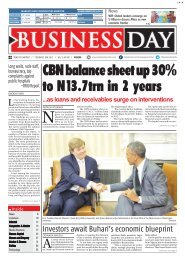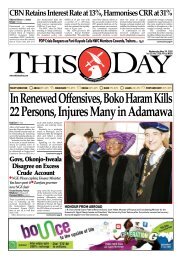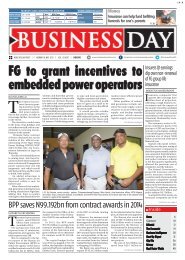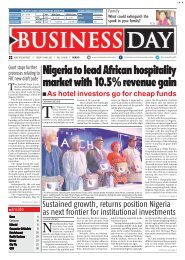Create successful ePaper yourself
Turn your PDF publications into a flip-book with our unique Google optimized e-Paper software.
52<br />
THE NATION TUESDAY, APRIL 28, 2015<br />
DESPITE the Cabotage Law,<br />
Nigeria is losing N1.8 trillion<br />
yearly to foreign shipowners<br />
in cargo haulage, it has been<br />
learnt.<br />
Under the law, coastal trade is reserved<br />
for indigenous shipowners;<br />
their foreign counterparts are allowed<br />
to participate in the business<br />
subject to a waiver by the Federal<br />
Government.<br />
To the Shipowners Association of<br />
Nigeria (SOAN), the law is not serving<br />
its purpose because the group’s<br />
members cannot handle cargoes<br />
that pass through the nation’s waterways.<br />
The group met in Lagos last week<br />
on how to engage the in-coming<br />
THE NATION<br />
BUSINESS<br />
MARITIME<br />
Stories by Oluwakemi Dauda<br />
MaritimeCorrespondent<br />
Muhammadu Buhari administration<br />
on involving its members in<br />
crude oil lifting.<br />
Sources close to the group said a<br />
vessel involved in offshore operations<br />
collects at least $5,000 daily.<br />
This, according to a source, is the<br />
least amount collected by foreign<br />
vessels on the nation’s waters.<br />
The country, he said, is losing $10<br />
billion yearly to foreigners because<br />
of the government’s alleged<br />
failure to engage indigenous ship<br />
chandlers; and also losing N45 billion<br />
yearly due to the preference<br />
given to foreign ship owners and<br />
their choice of insurers over the indigenous<br />
companies in the lifting<br />
and importation of fuel.<br />
The Federal Government, a<br />
source said, loses over N3.5 billion<br />
monthly in freight insurance, urging<br />
the in-coming administration<br />
to arrest the situation.<br />
• Deputy Comptroller of Customs Biri inspecting the seized goods at the Government Warehouse in Lagos.<br />
PHOTO: OLUWAKEMI DAUDA<br />
Customs seizes N105m goods concealed<br />
in train<br />
THE Monitoring Team of the<br />
Nigeria Customs Service<br />
(NCS) at Idiroko has intercepted<br />
a train from Kano, carrying<br />
assorted textile and other goods at<br />
the Abeokuta Railway Station in<br />
Ogun State.<br />
The team was led by the Deputy<br />
Comptroller of Customs, Yahaya<br />
Usman Biri.<br />
Sources told The Nation that the<br />
team had been on the trail of the<br />
consignment from Kano following<br />
a tip off that the items came from<br />
unapproved routes to the train station.<br />
The items evacuated from the<br />
two coaches included 27 bales of<br />
blanket, 141 long bales of ankara<br />
materials, 49 cartons of choc balls,<br />
two gallons of vegetable oil, four<br />
bags of 40kg parboiled rice, three<br />
small sacks of printed textile materials,<br />
one carton of bonny cream<br />
milk, one sack of detergent and<br />
159 small sacks of textile materials.<br />
A senior Nigerian Maritime Administration<br />
and Safety Agency<br />
(NIMASA) official, who pleaded<br />
not to be named, said the amount<br />
foreign ship owners pay to the<br />
agency and others is meagre compared<br />
to what they repatriate.<br />
He put the Federal Government’s<br />
loss at over N1.8 trillion yearly,<br />
wondering why the loopholes<br />
were not plugged by the out-going<br />
administration.<br />
Indigenous insurance companies,<br />
he said, were sidelined in the insurance<br />
of imported fuel both locally<br />
and internationally<br />
“The sorry situation we find our<br />
country as a maritime nation is ridiculous<br />
and in absolute contravention<br />
of the Local Content Act.<br />
“For instance, Nigerian ship chandlers<br />
are supposed to be given 95<br />
per cent of business opportunities<br />
in the ship chandelling industry<br />
and other opportunities to render<br />
services in the ships. The in-coming<br />
administration needs to ensure<br />
that the local content Act is wholly<br />
implemented in order to create<br />
jobs for Nigerians in the maritime,<br />
oil and gas sectors effectively.<br />
“The participation of multinational<br />
companies in ship chadling<br />
has rendered many Nigerians jobless<br />
and the Buhari led government<br />
must correct these anomalies.<br />
“When the Cabotage regime<br />
came on stream, the intention was<br />
mainly to stimulate the development<br />
of indigenous capacity in the<br />
Nigerian maritime industry.But<br />
many years after, the situation remains<br />
the same despite the despite<br />
the efforts by NIMASA.<br />
“In the oil and gas industry, Nigeria<br />
has close to 500 oil wells. For<br />
each well, there is a rig, which is<br />
supported by a minimum of five<br />
ships, and they are called oil support<br />
vessels. Each of the foreign<br />
ships earn $5,000, while others earn<br />
$150,000 per day.<br />
“The Cabotage Act seeks to reserve<br />
domestic coastal trade or<br />
Cabotage trade within Nigerian<br />
coastal and inland waters to vessels<br />
built and registered in the country,<br />
wholly owned and manned by<br />
Nigerian citizens. Foreign-owned<br />
vessels and companies are, however,<br />
allowed to participate in<br />
Cabotage trade within Nigerian<br />
waters, subject to obtaining a<br />
waiver and or license from the Federal<br />
Ministry of Transport.<br />
“Almost 10 years, not much has<br />
changed, as the indigenous vessel<br />
owners, who the law was designed<br />
to protect remained sidelined and<br />
impoverished while foreign shipping<br />
companies dominate the trade<br />
and the Federal Government not<br />
looking responsive.<br />
“I can say conveniently that even<br />
e-mail: maritime@thenationonlineng.net<br />
Cabotage: Nigeria loses N1.8tr yearly to<br />
Buhari urged to review policy<br />
THE Free-on-Board (FoB)<br />
policy is causing the country<br />
a huge loss, the President, Association<br />
of Nigerian Licensed Customs<br />
Agents (ANLCA), Alhaji<br />
Olayiwola Shittu, has said.<br />
He wants the in-coming<br />
Muhammadu Buhari’s administration<br />
to review the policy.<br />
FoB is a trade policy that allows a<br />
buyer to pay for the shipment and<br />
landing costs of the goods from the<br />
port of origin.<br />
Shittu urged the President<br />
Goodluck Jonathan administration<br />
to adopt Cost, Insurance and Freight<br />
(CIF) for the lifting of crude oil.<br />
CIF, he said, gives the seller the<br />
right to arrange for the ferrying of<br />
goods by sea to a port of destination,<br />
and provide the buyer with the<br />
documents necessary to collect<br />
them from the carrier.<br />
Shittu said a major part of the problems<br />
faced by indigenous owners<br />
was due to the failure to enforce the<br />
foreign ship owners<br />
Nigerian Maritime Administration<br />
and Safety (NIMASA) Act,<br />
2007, eight years after its enactment.<br />
He said Nigeria is the only country<br />
that is still using the FoB<br />
policy.<br />
A member of the group, Mr Segun<br />
Ogunsanu, said the indigenous<br />
shipping firms have over the years<br />
been grappling with lack of cargo<br />
support, adding that this had made<br />
many of them to close shop, a development<br />
which led to unemployment<br />
years after the enactment<br />
of the act and other legislations,<br />
such as the Cabotage Act, 2003 and<br />
Nigerian Content Act 2010.<br />
“The policy is being used to the<br />
detriment of the economy,” he<br />
said.<br />
Ogunsanu said the adoption of<br />
either the CIF or FoB policy by<br />
the Federal Government should<br />
be based on how the policy is of<br />
advantage to the parties involved<br />
The items have been transferred<br />
to the government warehouse in<br />
Ikeja.<br />
The team has begun investigation<br />
to establish the source of the consignment.<br />
The team said it succeeded because<br />
of the support of Comptroller-General<br />
of Customs (CGC)<br />
Alhaji Dikko Abdullahi.<br />
The team had made a similar seizure<br />
at Iddo Train Terminus in Lagos<br />
with the collaboration of the<br />
Federal Operation Unit (FOU) Zone<br />
‘A’ officers.<br />
• Shittu<br />
in the shipping. The intention of<br />
the Cabotage Act, he added, was to<br />
give indigenous shipping firms the<br />
support to enable them to compete<br />
with their foreign counterparts,<br />
who have usurped the cargoes on<br />
the international shipping route<br />
and the coastal and inland region.<br />
in the crude oil carriage that they<br />
do today, if SOAN, ISAN is allowed<br />
to do 60 per cent of their<br />
own allocation, they will be<br />
putting back more than about<br />
N1.5trillion or N1.8 trillion into<br />
the economy and that is almost<br />
half of the budget. What is the<br />
budget? It is N4 trillion or something<br />
above that. If the ship owners<br />
contribute N1.5 trillion or<br />
more into it, the multiplier effect<br />
of it would be seen in our economy<br />
and the job it would create.<br />
Speaking at the inauguration of<br />
SOAN in Lagos last week<br />
NIMASA’s former Director-General<br />
Mr Temisan Omatseye said<br />
there was no magic to end foreign<br />
domination apart from clear cut<br />
vision, good policy and implementation<br />
and demonstration of<br />
enough political will by those in<br />
government.<br />
“With the poor state of our<br />
economy, I think it would be suicidal<br />
for us to continue to engage<br />
foreigners to lift our crude. The<br />
government must ensure that<br />
every dollar we pay for the carriage<br />
of our oil comes into the<br />
economy.<br />
“I am very sure that by the time<br />
we put the naughty issue before<br />
the government it would be ready<br />
to engage indigenous ship owners.<br />
“We are businessmen and we<br />
won’t ask government for money<br />
but tell them how to open up the<br />
industry,” he said.<br />
Omatseye also bemoaned several<br />
millions of dollars the country is<br />
losing to foreign ship owners and<br />
urged the government to end the<br />
problem with good policy formulation.<br />
SOAN’s President, Mr Greg<br />
Ogbeifun, promised that the group<br />
would promote the interest of Nigerian-owned<br />
vessels and also provide<br />
a forum for dialogue among<br />
indigenous ship owners.<br />
“SOAN comprise ship owning<br />
companies with proven track<br />
records of activities in the industry<br />
recognised by upstream and<br />
downstream sectors of the shipping<br />
industry as well as by the private<br />
and public sectors of the industry.<br />
Ogbeifun, who is also the Chief<br />
Executive Officer of Starz Group,<br />
said SOAN was set up to facilitate<br />
participation of Nigerian shipowners<br />
in international fora on<br />
shipping matters through effective<br />
representation<br />
“To cultivate and maintain good<br />
relations with the government and<br />
maritime authorities by contributing<br />
expertise in formulating policies<br />
and regulations on national<br />
and maritime activities.<br />
“We won’t set agenda for the new<br />
government but will only set a road<br />
map for them. We are not a pressure<br />
group but a group of businessmen<br />
with proven track record,” he<br />
said.<br />
Five Customs officers in<br />
trouble over ‘shady’ clearance<br />
FIVE senior Customs officers at<br />
the Tin-Can Island Port, Lagos,<br />
have been queried for alleged<br />
dereliction of duty.<br />
They have been invited to the<br />
Federal Operations Unit (FOU) in<br />
Ikeja, Lagos to explain why they<br />
released a 20-foot container carrying<br />
goods not declared in the Bill<br />
of Lading.<br />
Sources said the officers had been<br />
ordered to go to the FOU before<br />
moving to Abuja to face a disciplinary<br />
panel.<br />
A source said: “The container was<br />
released by senior Customs officials<br />
at Tin-Can port but FOU officers<br />
intercepted the container,<br />
following a tip-off.<br />
“Some of the items in the container<br />
include a vehicle, tiles and<br />
over 300 cartoons of items that<br />
were not declared by the importer.”<br />
FOU’s Public Relations Officer<br />
Uche Ejesim confirmed the seizures.<br />
He did not give details.

















